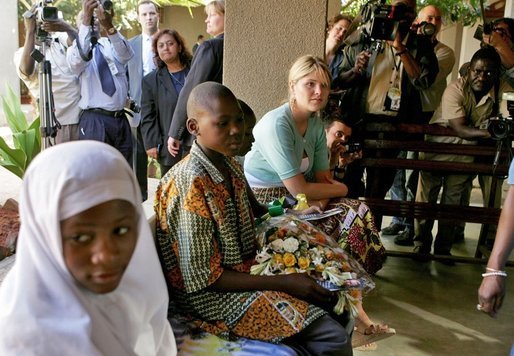
"The death of Mrs. S. was caused by two major diseases: HIV/AIDS and extreme poverty. Her death is far from being an isolated incident. The synergistic impact of HIV/AIDS and extreme poverty arises on a regular basis at the national hospital. I share the stories of patients in Africa not to make you feel guilty or to ask you to give money to the next poor beggar or charity, but to lend you a perspective. The gap between rich and poor has never been greater in human history. The current HIV/AIDS epidemic has inflicted the most devastating medical impact of the past 600 years, and the disease of poverty continues to present the greatest barrier to good health."
Morocco RPCV Paul Drain writes: Africa's devastating challenge: HIV/AIDS and extreme poverty
Africa's devastating challenge: HIV/AIDS and extreme poverty
By PAUL DRAIN
GUEST COLUMNIST
Caption: Jenna Bush listens to children with HIV/AIDS at PASADA in Dar es Salaam, Tanzania, Wednesday, July 13, 2005. “PASADA trains caregivers to provide home-based care for people living with AIDS. PASADA also provides support to orphans and other vulnerable children - boys and girls who have lost one or both of their parents to AIDS. These children need help with all the challenges that come with growing up - and with the responsibilities that an adult would usually handle,” said Mrs. Bush in her comments. White House photo by Krisanne Johnson
I have never seen this patient before, yet she is like many others. She lies on a hospital bed in Dar es Salaam, Tanzania's capital, clinging to life by a thread. But even that will soon be taken from her. By the time we see her on our medical rounds, there is very little we can do. Her death this morning, like that of so many others, will be caused by a combination of two treatable diseases.
We come upon her in the far corner of the medical ward halfway through our morning rounds. Immediately, I am stunned at the general presentation of Mrs. S. She holds a blank stare out an open window. Her eyes are shifted back in their sockets. Her breathing is rapid but regular. Her pulse is also rapid, and her heart is not beating in a normal rhythm.
I recently completed my training in the core areas of clinical medicine at the best medical school in the country for teaching clinical medicine. I generally felt competent and capable to approach patients as medically complex as this one. The key is being systematic, but a systematic approach relies on having available resources. However sound my U.S. medical training, I've repeatedly felt unprepared to handle the difficult situations that arise when resources aren't available.
We have few precious minutes with this patient. Since there is no supervising physician, I tell the intern that we need to "call a code." This should set off a flurry of activity, such as supplying oxygen, preparing cardiovascular medications and obtaining a defibrillator in case we need to shock her heart. Two people should be ready to start CPR. However, we're in Africa, and, here, there are no codes.
Immediately, we need to give her some oxygen and intravenous fluids. While every second counts, the resident, intern and nurses are not prepared to act quickly. The nurse eventually wheels over the one tall, rusty oxygen tank that resides on this ward of 42 beds. A glass bottle with "sterile" water hangs from the tank by a rope and has a long rubber tube for the outflow of oxygen. After looking more closely, I realize that this particular piece of rubber tubing is normally used to suction out stomach contents. Further, it's been used for another patient. What Mrs. S. needs is a high flow of oxygen through a full mask, not a thin tube clogged with another patient's dried phlegm.
Her respirations are now becoming slow and shallow. Ideally, we should put a tube down into her lungs to connect her to a ventilator and take control of her breathing. It's already clear that none of these resources are available. Her breathing is rhythmic, and gradually becomes more delayed with each breath. Her eyes are fixed and dilated. I feel the irregular pulse in her neck, as she remains motionless on the bed.
Mrs. S. is a 31-year-old woman who is known to be HIV-positive. She has been married for seven years, but has no children. She was admitted to the hospital four days ago after she had been suffering from a week of diarrhea and vomiting. Since she was admitted, she has received one unit of blood. Nothing else has been done for her.
She should already have an intravenous line in her arm, so we can quickly give her fluids, but she doesn't. A nurse spends our remaining time trying to insert a catheter into a vein in her arm. The one portable heart monitor for the entire medical block is not on our floor.
Our activity is becoming futile. Her pulse continually weakens. Her breathing gradually becomes more delayed. I hold her wrist with one hand and feel for the pulse in her neck with the other. She is now getting some oxygen through the small tube, and the nurse is still trying to put in the intravenous line. She hasn't been given any heart-stimulating medications. As I watch her life slip away, I realize there is little reason to take this any further. We don't have the resources, and without them there is nothing we can do.
Although nothing is said, the resident stops giving her oxygen, the intern stops preparing an injection and the nurse stops inserting the intravenous line. She has no family around, and this is no way to die. I hold on to her wrist as she finally stops breathing. I watch, feeling helpless. I feel for the pulse in her neck, but it's not there. "She's died," I whisper.
After a few moments, the group of seven white coats moves on to the next patient. I stay behind to look over her chart. Her CD4 T-cell count is 17, which is extremely low (a T-cell count under 200 is low), and she had not been receiving HIV medications. Mrs. S. died because she had too few immune cells to fight off any infections. Mrs. S. also died because she was poor and didn't have access to HIV care and medications.
One might think that this story occurred in a remote rural clinic, but Mrs. S. died in one of Africa's national hospitals. Tanzania, where half the population lives on less than $1 per day, is one of the poorest developing countries in the world.
HIV/AIDS is having a tremendous and debilitating impact on the region. Almost 10 percent of adults are HIV-positive, and women are infected more than men. Further, over the course of the HIV epidemic, life expectancy has been decreasing. The child that I helped deliver a couple weeks ago is expected to live only 45 years, which is five years less than what it would have been 30 years ago.
By comparison, life expectancy in the U.S. has increased by six years over the past 30 years, and is now 77 years and growing steadily.
The national hospital deals directly with the intersection of HIV/AIDS and poverty. About half of the patients admitted to the medicine ward are infected with HIV. Most have never been tested for HIV and don't know their serostatus. Furthermore, since those with money choose private hospitals, all of these patients are extremely poor. These patients tend to seek medical attention late in the disease process, and many, like Mrs. S., have advanced HIV-related diseases by the time they arrive at the hospital.
Part of the medical problem lies in financing the health care system. The total annual expenditure on health is less than $20 per person and is about 400 times less than the annual health expenditures for an average American. Often, the problem lies with a patient's inability to pay a simple fee, which is a major determinant of whether we can validate a suspected diagnosis. Occasionally, the necessary testing materials may not be available. When the lab runs out of HIV tests, we rely on seeing a characteristic fungus growing in the back of the mouth, an almost sure sign of HIV in this setting.
Over the last 10 months, I've witnessed many mismanaged medical cases. It has been frustrating and difficult, and it has shaken my spirit. Most doctors here do want the best treatment for their patients, and they do what they can. On our medical rounds, instead of talking about what we would like to do for a patient, we typically end up discussing what we can do for a patient. But still, it is often not enough.
The need for addressing HIV care and extreme poverty in Africa is dire. Currently, more than 25 million Africans are living with HIV and about 6,200 die from HIV/AIDS every day. The disappearance of young parents and adults has left behind 12 million orphaned children and a depleted work force to support the battered economies. As of two years ago, few Africans had any access to life-saving HIV medications.
HIV medications are now being made available to HIV-infected Africans, and there is good reason for optimism. HIV care and treatment programs, which provide free counseling, testing, medical care and HIV medications, have now been established in several African countries. These programs have been lauded as a great success, and with good reason.
A major obstacle in scaling up their coverage is a very limited supply of health care providers. In this region there is one doctor for every 33,000 patients, while the U.S. and most developed countries have one doctor for every 500 people. Since the average doctor earns only $400 per month, many doctors leave in search of better wages. Given that they can make much larger salaries abroad, it is difficult to blame the physicians themselves.
The death of Mrs. S. was caused by two major diseases: HIV/AIDS and extreme poverty. Her death is far from being an isolated incident. The synergistic impact of HIV/AIDS and extreme poverty arises on a regular basis at the national hospital.
The good news is that both of these diseases are treatable, even in one of the most resource-poor settings in the world. Providing HIV care and treatment has been saving the lives of Africans. As we continue to fight in this battle, we must now begin to seriously address the world's other main disease: extreme poverty.
I share the stories of patients in Africa not to make you feel guilty or to ask you to give money to the next poor beggar or charity, but to lend you a perspective. The gap between rich and poor has never been greater in human history. The current HIV/AIDS epidemic has inflicted the most devastating medical impact of the past 600 years, and the disease of poverty continues to present the greatest barrier to good health.
HIV/AIDS and extreme poverty are the two most important issues of our lifetime, and if we lose this perspective then they will only continue to become worse. We must not allow the dialogue for eliminating HIV/AIDS and extreme poverty to burn out like a neglected fire. We must engage in the dialogue and retain our global perspective.
Paul Drain, a former Peace Corps volunteer, is in his last year of medical school at the University of Washington. As part of a fellowship from the U.S. National Institutes of Health, he saw patients in a national public hospital in Tanzania.
























